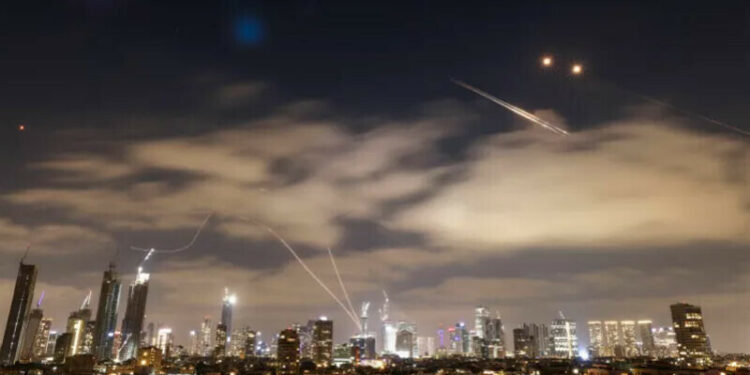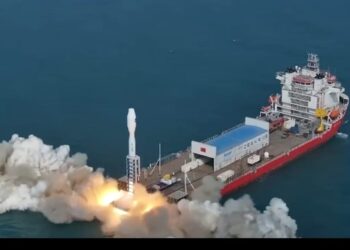Tensions between Iran and Israel reached an unprecedented peak early Sunday morning as Iran launched a massive missile assault on Israeli cities, including Tel Aviv, Haifa, and occupied Jerusalem. This marked Iran’s most extensive attack on Israel to date, sparking fires, injuring civilians, and damaging key infrastructure such as the Haifa power plant.
Escalation Following Israeli Strikes on Tehran
The missile barrage came in direct retaliation to a series of Israeli strikes across Iranian territory the previous day. According to Iranian media, Israel targeted multiple Iranian cities including Tehran, Mashhad, Isfahan, and the sensitive Fordow nuclear facility. In response, Iran initiated its most aggressive counterattack, firing approximately 100 ballistic missiles at various Israeli locations.
Iranian missiles struck deep into Israeli territory, causing explosions in Tel Aviv, Haifa, and occupied Jerusalem. One of the most severe incidents occurred in Haifa, where the city’s main power plant was hit and engulfed in flames. Israeli emergency services were quickly dispatched, reporting widespread destruction and civilian injuries.
Widespread Panic and Power Outages in Israel
As Iranian missiles rained down, sirens blared across major Israeli cities, including Tel Aviv, Haifa, and Jerusalem. Citizens were ordered to take shelter and remain indoors. In several areas of central Israel, power outages were reported due to damage inflicted by the missile strikes.
The Israeli media has described the assault as Iran’s most significant direct attack on Israeli soil, exposing critical vulnerabilities in the Israeli air defense system. Despite claims by the Israel Defense Forces (IDF) that many of the missiles were intercepted, numerous strikes found their targets, particularly in Haifa and central Israel.
According to the Jerusalem Post, Israeli medical services confirmed that at least 15 civilians were injured, some critically, and many buildings sustained heavy damage. ZAKA, an Israeli emergency response organization, confirmed that one missile directly struck a building in northern Israel.
Israel Responds With Counterstrikes on Iran
In retaliation for Iran’s ballistic missile barrage, Israel responded swiftly with renewed missile attacks on Iran. Targets included central Iranian military facilities, with specific emphasis on what the Israeli military identified as missile storage and launching installations.
Iranian sources confirmed that Israel’s strikes caused substantial damage and civilian casualties. The Iranian Foreign Ministry building in Tehran was reportedly hit, with several injuries reported and extensive damage to the building, including shattered windows in the ministry’s library.
Iranian Deputy Foreign Minister released a video showing the aftermath, accusing Israel of deliberately targeting civilian institutions and government infrastructure.
Civilian Casualties and Ongoing Humanitarian Crisis in Iran
According to Iran’s Ministry of Health, at least 224 civilians have been killed since the beginning of Israel’s offensive on Tehran. Iranian media emphasized that 90% of the casualties were non-combatants, including women, children, and infants.
The Tehran Times reported that many newborns were injured in missile strikes, further inflaming public sentiment and bolstering Iran’s justification for its aggressive response.
Major General Gholam Ali Rashid, commander of Iran’s Khatam al-Anbiya Central Headquarters, stated that military operations against Israel will continue until Israel “deeply regrets” its aggression.
Iran’s Warning to Israel: Leave Occupied Territories
Iran’s military and political leadership issued a unified warning to the Israeli government and its citizens. A statement from the Iranian armed forces urged the “Jewish occupiers” to vacate the occupied Palestinian territories, declaring this the only viable option for their survival.
The statement emphasized that Iran would not allow its enemies to use civilians as human shields, and that continued Israeli aggression would be met with increased force.
Haifa Power Plant Blaze Highlights Strategic Targeting
The attack on the Haifa power plant was one of the most devastating blows to Israel’s infrastructure. The power station caught fire after a direct missile strike, leading to widespread blackouts in northern Israel.
Footage circulating on Israeli and international media showed thick plumes of smoke rising over the Haifa region. Emergency crews worked around the clock to extinguish the flames and stabilize the city’s power supply.
IDF Claims Interception of 100 Iranian Drones
The Israeli Defense Forces (IDF) confirmed that they intercepted more than 100 Iranian drones as part of “Operation Rising Line.” The military stated that both the Israeli Air Force and Navy were deployed to intercept the aerial threats.
Despite these interceptions, many missiles still managed to breach Israeli airspace and cause significant damage, raising concerns about the effectiveness of Israel’s Iron Dome and other defense systems.
Global Reaction and Regional Implications
The international community is closely monitoring the situation, fearing that the conflict could escalate into a broader regional war involving other players like Hezbollah, the Houthis, and Western allies of Israel and Iran.
Human rights organizations have called for restraint and immediate cessation of hostilities. The United Nations has reportedly initiated emergency consultations, while countries like the United States, Russia, and China have urged both sides to de-escalate.
Conclusion: A Conflict on the Brink
The intensification of hostilities between Israel and Iran marks a dangerous turning point in Middle Eastern geopolitics. As both nations exchange heavy fire and inflict significant casualties and infrastructure damage, the possibility of full-scale war looms large.
With Iran vowing to continue its operations until Israel ceases aggression, and Israel signaling its readiness for prolonged confrontation, the coming days are critical. The world watches anxiously, hoping for diplomacy to prevail before the conflict spirals further out of control.
Read more:..

























